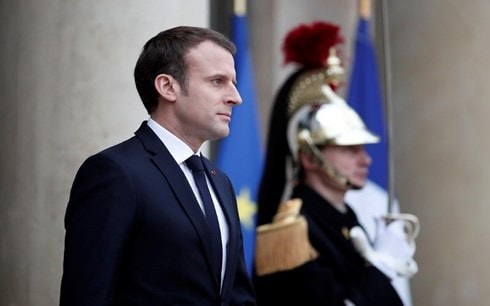President Macron visits China: Prospects for opening an “Asian chapter”
Mr. Emmanuel Macron will arrive in Xi'an, China on January 8 to begin his first Asian tour as President of France.
A Promising Start
For French President Emmanuel Macron, his visit to China from January 8-10 marked many "firsts".
|
| French President Emmanuel Macron. Photo: AP |
This is Mr. Macron's first foreign trip in 2018, his first trip to Asia as President of France and also his first visit to China, Asia's number 1 economic power and a leading important partner of both France and the European Union.
All these “firsts” make this trip an official act of opening the “Asian chapter” in France’s foreign policy under Mr. Macron.
When he first took office in May 2017, Mr. Macron focused his diplomatic efforts mainly on Europe. In the final months of 2017, it was the turn of Africa and the Middle East.
Asia is a region where a young, highly successful foreign policy president like Mr. Macron has yet to declare or implement any specific strategy.
The trip to China, therefore, will reveal the first signs of how France approaches China in particular and the Asian region in general.
This is all the more remarkable because China is not only an extremely important partner to France and Europe, but also because during the election campaign as well as when he first became President of France, Mr. Macron always emphasized China as a strategic rival to the European Union.
In fact, Mr. Macron has always used competition with China as a lever to promote the reform projects of the European Union.
Therefore, European observers are very interested in seeing from words to actions how the young French President will handle the relationship with a partner that is increasingly "haunting" Europe.
Because, it is certainly not a coincidence that Mr. Macron chose China as the first Asian country to visit, instead of France's more important and "comfortable" partners in Asia such as Japan or India.
“The Road” and Obsession
China is an important economic partner of the European Union, accounting for 15% of the bloc's total trade turnover. For France, China is also the most important trading partner in Asia.
That is the reason why accompanying Mr. Macron on this trip to China are the largest French corporations in the fields of aviation, food, energy, and infrastructure industries.
A flurry of contracts was mentioned by the French press before the trip. It is expected that Chinese and French businesses will sign about 50 economic contracts on this occasion, notably the sale of 100 aircraft by Airbus to a Chinese aviation company.
However, in economic relations with China, France's biggest concern lies in another aspect, the trade deficit and the ability of French businesses to access the Chinese market.
Currently, France is suffering from a huge trade deficit with China, amounting to about 30 billion euros last year.
This is France's largest trade deficit with an economic partner in the world and is expected to continue to increase.
Over the years, successive French governments have made it a top priority in economic relations with China to re-establish a balance in trade exchanges, by calling on China to implement the principle of "give and take" and open its market more strongly to French businesses.
That is also what Mr. Macron will try to convey to Mr. Xi in Beijing.
But, there are also other important topics to discuss.
Mr Macron's visit to Xi'an, the starting point of the ancient “Silk Road” connecting East and West, carries a clear message.
Recently, China's mega project "One Road, One Belt" to recreate the Silk Road in the new era has attracted both attention and concern from European countries.
The economic benefits promise great promise, but cultural, administrative, and even geopolitical challenges are also big questions for European countries, especially a country like France that always wants to maintain its position as a regional power.
The problem for France with China's mega-project, as analyzed by French scholars, is to determine where France will stand and play the role of a key partner or simply the terminus of a transcontinental train stretching from Xi'an to Lyon?
And finally, Mr. Macron also had to raise with Chinese leaders another very “European” concern: Chinese investments in Europe and vice versa.
Over the past few years, Chinese investment in the old continent has increased by several dozen percent each year, even up to 77 percent in 2016. On the contrary, EU investment in China has decreased each year, in 2017 it decreased by 23 percent.
But the biggest worry is not the numbers, but where they are going: Europe is worried about China investing heavily in cutting-edge industries in its countries.
In 2017, European Commission President Jean-Claude Juncker spoke of the need to introduce laws restricting foreign investment, clearly referring to China, into key European industries, for fear of losing technology and damaging national interests.
Mr. Macron himself also mentioned the same thing in his speech on the future vision of the European Union in late September 2017.
The question now is how will Mr. Macron talk about it with Chinese leaders?./.


